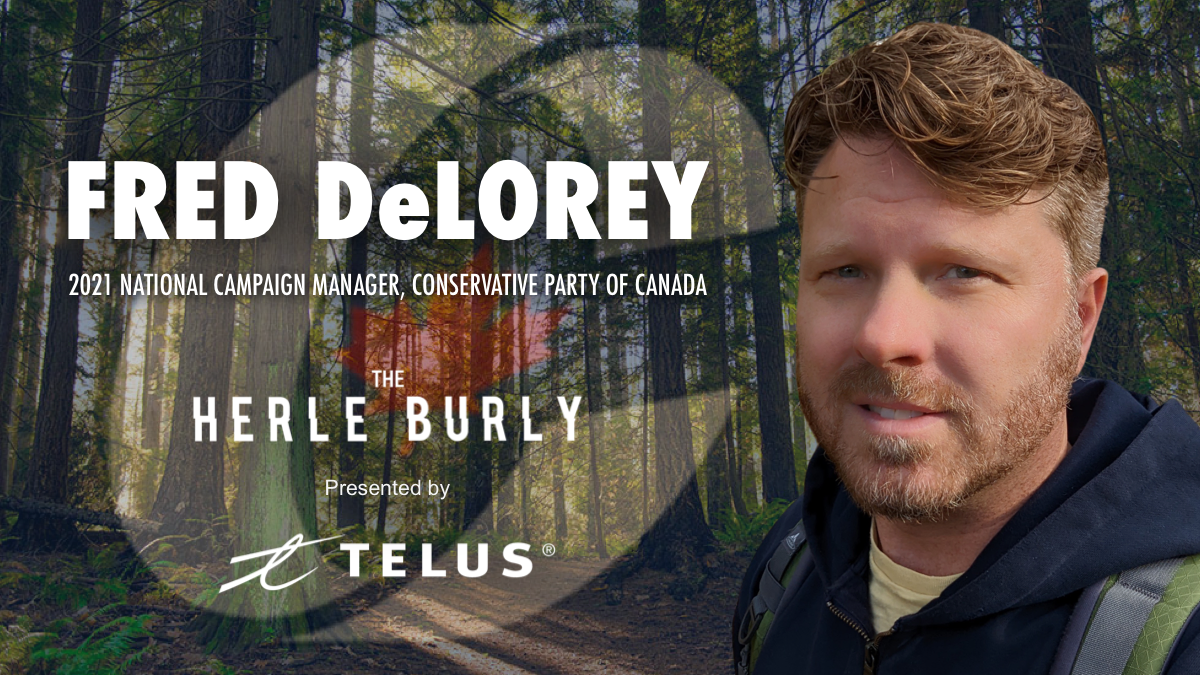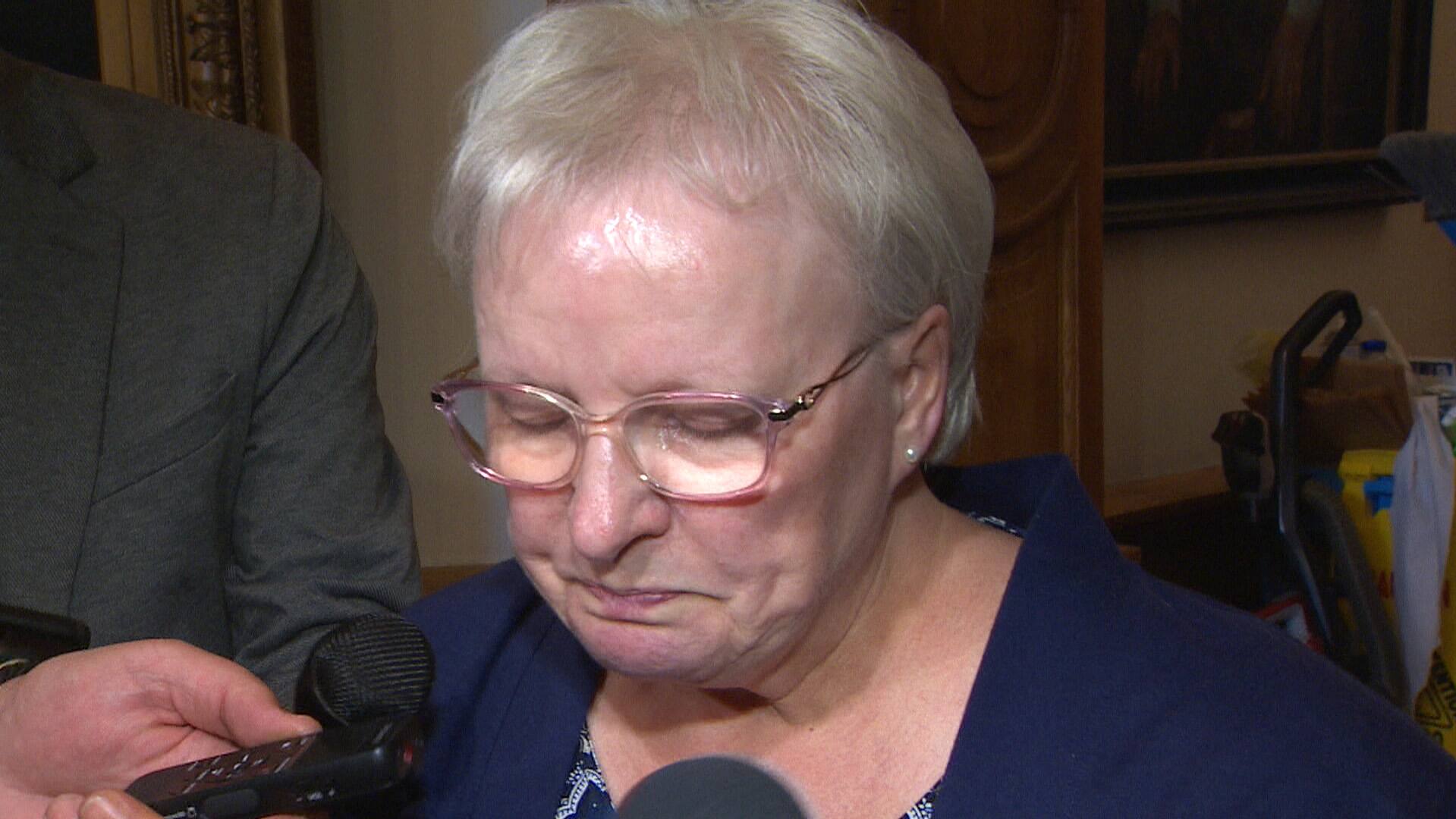Fred DeLorey, Conservative party director, seeking Peter MacKay's seat
Central Nova considered a Tory stronghold in Atlantic Canada
CBC News has learned that senior Conservative party organizer Fred DeLorey is hoping to fill the Central Nova nomination slot now left vacant by the surprise exit of Justice Minister Peter MacKay.
MacKay gave notice last week that he will not be running for re-election this fall.
- Peter MacKay cites 'love for my family' as he bows out of federal politics
- Peter MacKay just latest loss for federal Conservatives
- Timing of Peter MacKay's departure politically damaging
Delorey was born in Nova Scotia, but has spent the last few years in Ottawa. He was an advisor to Prime Minister Stephen Harper on Atlantic Canadian issues before moving to the party's office, where he handled communications. Since 2013 he has served as director of political operations for the Conservative Party.
Central Nova has long been considered the closest thing the Conservative Party has to a safe seat in the province.
Tory stronghold in peril?

MacKay won the seat with 57 per cent of the vote in 2011.
However, recent polls suggest Tories could be in for a strong challenge across Atlantic Canada, causing some to wonder if the lack of an incumbent could make Central Nova winnable for another party.
Central Nova Conservatives were not the only ones left scrambling for a candidate. That same day MacKay made his announcement. the Liberals nominated candidate in the riding, retired Canadian Forces veteran David MacLeod, revealed that he, too, would be exiting the race for personal reasons.


Intro


Your Guiding Star in Canadian Government Relations and Public Affairs.

Fred DeLorey
Partner
fred@northstarpa.ca
Fred DeLorey: 2021 National Campaign Manager, Conservative Party of Canada

https://www.youtube.com/watch?v=UknWOmerzMo
We have what I think is a great pod for you today because our guest is someone I’ve wanted to get in here for a long time. He’s someone I have a lot in common with, as we’ve both been strategists and campaign directors for Prime Ministerial candidates.
Fred DeLorey is our guest today, out of the political wilderness and into the podcast!
Most know him as the man who helped Erin O’Toole win the Conservative leadership in 2020. And then, managed Mr. O’Toole’s ultimately unsuccessful bid to become Prime Minister in 2021.
Fred has also served as Director of Field Operations for Ontario Premier Doug Ford. He a former Director of Political Operations for Stephen Harper. As well as Director of Comms. Prior to that, he was Atlantic Canada Advisor in the Office of the Prime Minister. He’s even run for political office himself, in Central Nova in 2015. Right now, he’s a Managing Partner at Deslauriers Public Affairs.
So, here’s our conversation today:
We’re going to break down the 2021 Campaign. What actually happened? What Fred hoped would happen? What surprised him? And what got in the way of a victory?
We’ll also talk China election interference. If you read Fred’s op-ed in The Star on March 5th, he advocates for a different approach than a public inquiry.
And finally, we’ll do a little Pierre Poilievre speculating. What’s going to happen in the next election? And would 2019 or 2021 been any different with Poilievre as leader, instead of Scheer or O’Toole?
Thank you for joining us on The Herle Burly podcast. Please take a moment to give us a rating and review on iTunes or your favourite podcast app.
contact@airquotesmedia.comDorothy Shephard is latest PC MLA to leave politics
One-third of Tory candidates elected in 2020 have now resigned or opted not to run again
Another Progressive Conservative MLA who clashed with Premier Blaine Higgs has decided not to be part of his campaign for re-election this year.
Four-term Saint John Lancaster member Dorothy Shephard, who was health minister during the worst part of the COVID-19 pandemic, says she will not run again.
Shephard said her public break with Higgs last year over Policy 713 and his leadership style were just the latest in a series of "challenging times" during her 14 years in politics, and this was the right time for her to look at other ways to contribute.
Shephard was one of six PC MLAs who voted with the opposition last June on a Liberal motion calling for more study of changes to Policy 713 on gender identity in schools. She resigned from cabinet the same day.
 From
top left to right, Andrea Anderson-Mason, Trevor Holder, Dorothy
Shephard, Daniel Allain, Ross Wetmore and Jeff Carr. Shephard was one of
the six PC MLAs who voted with the opposition last June on a Liberal
motion calling for more study of changes to Policy 713. (Jacques Poitras/CBC)
From
top left to right, Andrea Anderson-Mason, Trevor Holder, Dorothy
Shephard, Daniel Allain, Ross Wetmore and Jeff Carr. Shephard was one of
the six PC MLAs who voted with the opposition last June on a Liberal
motion calling for more study of changes to Policy 713. (Jacques Poitras/CBC)
The changes included requiring parental consent before teachers and staff can use a child's chosen pronoun in verbal or official communication.
She told CBC News that she plans to stay involved with the PC Party and defend its moderate, centrist values.
"The way it's heading now, I think there is such a hyper-focused trend with far-right politics," she said. "That's my personal perspective."
She said the party should look back to the tenure of former prime minister Brian Mulroney to "understand the great accomplishments that come from centre-right, centre-left politics, and strongly promote that. So that's where my efforts are going to lie."
Higgs told reporters he wished Shephard the best in the future.
"She was dedicated to the province and dedicated to her riding, and that's what MLAs are supposed to do," he said.
But he pushed back at her comments about a rightward shift by the party.
"I guess we all have different interpretations of what 'to the right' means. If having parents involved in raising their kids and making sure that's an accepted practice is to the right, maybe we have to evaluate society."
Shephard said she plans to participate in PC Party annual meetings and other internal processes to try to help steer the party in a moderate, mainstream direction.
Her criticism of the party's direction were echoed by former Fundy-Royal Progressive Conservative MP John Herron, who confirmed Thursday he plans to run for the Liberals in the provincial riding of Hampton-Fundy-St. Martins.
He'll be taking on PC candidate Faytene Grasseschi, whose Christian conservative writings and views have generated "angst" among longtime Tory supporters, Herron said.
"It's their perspective that that nominee doesn't represent the progressive nature of this community," said Herron, who was elected twice as a PC MP in 1997 and 2000.
Former
Fundy-Royal Progressive Conservative MP John Herron, who confirmed
Thursday he plans to run for the Liberals in the provincial riding of
Hampton-Fundy-St. Martins, echoed Shephard's criticism of the PC party's
direction. (Submitted my John Herron)
Herron refused to be part of the federal Progressive Conservatives' merger with the Canadian Alliance in 2003 and sat as an independent in the House of Commons before running and losing as a Liberal in 2004.
Herron said "a broad and unlikely coalition" of Liberals, unhappy provincial Tories and "a touch of Green" had urged him to run against Grasseschi, whom Higgs has praised as part of a "revolution" within the provincial party.
"What we're seeing is a party based more on ideology," he said, adding that New Brunswickers favour "big bold policies" but "don't necessarily want to be part of a right-wing debating society."
Grasseschi said she would not respond to Herron's comments.
"I look forward to a campaign at this important time in our province when the cost of living and caring for the citizens of New Brunswick is top of mind for us all," she said in an email.
In a statement posted to social media Thursday morning, Shephard not-so-subtly rebutted comments Higgs has made about other PC MLAs who have opted out.
Carr,
back left, Holder and Shephard at a committee meeting in November.
Shephard and Carr have both said they won't run again, but Holder has
yet to say. (Alix Villeneuve/Radio-Canada)
"Surprisingly, politics was for me," she wrote.
"I am a Progressive Conservative, and I will carry the experience and learnings from these four terms into whatever the future holds next."
Earlier this year Higgs responded to other departures by saying about Jeff Carr that tough decision-making is "not for everyone" and, about Arlene Dunn, "politics turned out to not be for her."
In her statement, Shephard pointed to several initiatives she was proud of during her time as a minister, including kinship legislation in 2019 that clarified the rules around relatives able to care for a child who needs to be removed from the family home.
 Health Minister Bruce Fitch has hinted he will retire after 21 years as an MLA. (Shane Magee/CBC)
Health Minister Bruce Fitch has hinted he will retire after 21 years as an MLA. (Shane Magee/CBC)
Shephard is the ninth PC MLA elected in 2020 to quit or not to run again, meaning a full one-third of Higgs's victorious candidates from that campaign won't be on the ballot this fall.
At least three others may also bow out.
Two more of the six who rebelled over Policy 713 and the premier's leadership style, Trevor Holder and Andrea Anderson-Mason, have yet to say whether they'll run.
Health Minister Bruce Fitch has also hinted he will retire after 21 years as an MLA.
Unite the right: Timeline
CBC News Online | Updated Feb. 2, 2006
Talks to unite the right have had their rocky moments. The most recent, conducted during the summer of 2003, appeared to have broken down by early October, with PC Leader Peter MacKay and Alliance Leader Stephen Harper publicly pointing fingers at one another.
But later in the month, the leaders announced an agreement to merge the parties. The Conservative Party of Canada was formed weeks later.
The merger was a long time in coming. Progressive Conservatives and members of the old Reform and Alliance parties have held talks, attended unite-the-right conventions and planned co-operation in elections for nearly 16 years.
The following is a timeline of the key developments.
Jan. 23, 2006
The Conservative Party of Canada � barely two years after its formation � wins enough seats for a minority government. The party makes a breakthrough in Quebec, taking 10 seats. The Conservatives make some gains in rural Ontario.
June 28, 2004
The Conservative party wins 99 seats � mainly in Western Canada. The party fails to make the breakthrough it sought in Ontario and Quebec. The Conservatives attract just less than 30 per cent of the vote, well under the combined total for the Progressive Conservative and Canadian Alliance parties in the previous election. Still, Liberal losses are enough to usher in Canada's first minority government in 25 years.
March 20, 2004
Stephen Harper wins a first-ballot victory to become the first leader of the Conservative Party of Canada. Conservative party members gave Harper 56 per cent of the available points in the vote.
Dec. 6, 2003
90 per cent of 2,486 Tory delegates vote in favour of creating a new combined party to be called the Conservative Party of Canada.
Dec. 5, 2003
95 per cent of Canadian Alliance members vote in favour of merging with the Progressive Conservative Party to form a new party.
Dec. 4, 2003
David Orchard back in court to pursue legal action aimed at stopping the proposed merger of the Canadian Alliance and Progressive Conservative parties.
Nov. 21, 2003
David Orchard and a group of Conservative party members ask an Ontario Superior Court to rule that leader Peter MacKay violated the party's constitution with the merger plan.
Nov. 3, 2003
Canadian Conservatives express their disappointment after former Ontario Premier Mike Harris announces he is not interested running for leadership of a united Progressive Conservative-Canadian Alliance party.
Oct. 30, 2003
Progressive Conservative leader Peter MacKay kicks off a campaign within his party to drum up support for a merger with the Canadian Alliance.
Oct. 19, 2003
Alliance MPs approve of the deal by a vote of 51-1, with three abstentions. Nine MPs were not present for the vote.
Oct. 16, 2003
Canadian Alliance and Progressive Conservatives announce an agreement in principle on merging the two parties under the name The Conservative Party of Canada.
May 31, 2003
MacKay elected leader of the Progressive Conservative party, after striking a deal with fellow leadership candidate Orchard that he would not enter negotiations to unite the right.
March 2002
Harper wins the leadership of the Canadian Alliance on the first mail-in ballot, taking 55 per cent of the vote. Day is runner-up with 37 per cent. All but one of the seven ousted Canadian Alliance members leave the Progressive Conservative/Democratic Representative Caucus and return to the Alliance.
2001
Seven MPs either leave or are tossed out of the Alliance caucus for openly calling for the ouster of Stockwell Day as party leader. They form a short-lived coalition with the Conservatives, which becomes known as the Progressive Conservative/Democratic Representative Caucus. Headed by Joe Clark, Chuck Strahl and Deborah Grey, the caucus sits as a group in the House of Commons.
January - July 2000
In an attempt to unite the right, Preston Manning proposes a new party which eventually becomes the Canadian Alliance. Manning resigns as leader of Reform to seek the leadership of the new party. He loses to Day.
June 1997
Reform hits paydirt in the federal election, winning 60 seats and becoming the official Opposition. Preston Manning gets the keys to Stornoway. Not one Reform MP is elected east of Manitoba. The Progressive Conservatives rebound, taking 20 seats. The Liberals form a majority government with only 38 per cent of the vote, the same percentage won jointly by the un-united Reform and Conservative parties.
1993
In the federal election Reform wins 22 of Alberta's 26 seats, 24 of British Columbia's 30 seats, five seats in Saskatchewan and Manitoba, and one seat in Ontario, for a total of 52 seats. The PCs win just two.
1989
Deborah Grey wins a byelection in Alberta, giving Reform its first seat in the House of Commons.
1988
Reform fails to win a single seat in the federal election.
1987
Preston Manning becomes the first – and only – leader of the Reform Party of Canada. The party calls for free trade, demands an elected Senate, wants less government, less social services and less Quebec.
Tory-turned-Liberal John Herron loses
Liberal incumbent John Herron has lost his New Brunswick riding to Conservative Rob Moore.
Moore received less than 35 per cent of the popular vote, while NDP Pat Hanratty came in third with 16 per cent.
Moore is a lawyer and helped organize the Canadian Alliance in the riding in the late 1990s, running in 2000.
Herron represented the riding for two terms as a Progressive Conservative, but spoke against the merger. He said he believes the union of the Alliance and Progressive Conservative parties has swung his former party too far to the right for his comfort.
This area has given its support to the Progressive Conservatives in every election for the past 80 years, save for 1993, when Liberal Paul Zed won office. Zed was then beaten in 1997 by Herron.
In February 2004, Herron announced that he would leave the newly merged Conservatives to sit as an Independent and would run as a Liberal in this election.
New Brunswick MP jumping to Liberals
Former Tory MP John Herron announced Friday that he will switch political sides in the coming federal election, seeking the Liberal nomination in his New Brunswick riding of Fundy-Royal.
"After careful consideration, I have decided that as a Red Tory, the Martin Liberals represent my values and vision for the future of Canada," Herron said in a news release.
"Under the activist agenda of the prime minister, I will be more able to help my riding, my region and students."
Herron, 39, who was the Progressive Conservative critic for post-secondary education, the environment and official languages, has been member of Parliament for the riding located between Saint John and Moncton for two terms.
He defeated Liberal MP Paul Zed to take the seat in 1997, riding a wave of anti-gun-control anger in the traditionally Tory riding.
- FROM DEC. 8, 2003: Ex-PM bows out of new united-right party
Late last year, Herron voted against the Progressive Conservatives merging with the Canadian Alliance. Like former prime minister Joe Clark and Quebec MP André Bachand, he chose to sit as an Independent after the merger went through.
Fred McBride, a constituent in Herron's hometown of Hampton, said the decision to switch to the Liberals could cost the MP.
"Career-wise, I don't know whether it's a good idea, because this is strong PC country," he said.
"I don't know if he'll be able to keep his job. There's a lot of dissatisfaction with the people I talk to."
Herron is the second former Tory MP to turn Liberal over the united-right merger.
Just before Paul Martin took over as prime minister in December, Nova Scotia's Scott Brison crossed the floor and is now sitting with the Liberals.
- FROM JAN. 14, 2004: Another Conservative MP bolts the party
One former Alliance MP, British Columbia's Keith Martin, has also decided to seek the Liberal nomination in his riding in the runup to the anticipated spring election.
MacKay slams Brison for joining Liberals
Tory Leader Peter MacKay slammed MP Scott Brison's jump to the Liberal party Wednesday, saying it's a cynical and manipulative move to advance his career.
MacKay said Brison voted for and supported the ratification of the Alliance-Tory merger.
"It's really quite irreconcilable what he has done today," MacKay said. "What's the motivation?"
Saying the Liberals better reflect his personal values, Brison said Wednesday he was leaving the Progressive Conservatives to join a Paul Martin government. Martin made the announcement at an Ottawa news conference with the Nova Scotia MP.
MacKay said Brison failed to show up at caucus Tuesday and he only heard about his defection Wednesday morning.
"That speaks volumes," MacKay said.
MacKay said he's received calls from people in Brison's constituency "and they're calling it what it is, a completely cynical manipulative move by Mr. Brison to enhance his own personal career."
Brison made the decision to cross the floor following two conversations with Martin, who becomes prime minister on Friday.
- INDEPTH: Uniting the right
Brison received a standing ovation at a Liberal caucus meeting Wednesday.
A member of the PCs for more than 25 years, Brison said he struggled with the merger between the Progressive Conservatives and Canadian Alliance. He had said he would endorse the new party if it adopted progressive policies.
"The PC party the party I grew up in no longer exists," said Brison.
- PROFILE: Scott Brison
He says the Liberal party better reflects his personal values and the values of his constituents.
"There is great angst as to the direction of the new Conservative Party," said Brison.
- YOUR SPACE: Readers respond to this story
Martin welcomed Brison to the Liberal caucus, saying he will make a "tremendous addition" to the party.
Brison, who is openly gay, has told friends he expects the new Conservative Party will have problems with intolerant members of Parliament. He says he wants to avoid becoming what he calls a poster boy for gay issues.
"This nonsense about the party leaving him makes no sense," MacKay said. "This is about Scott Brison himself. This isn't about the political future of this new conservative movement. This is about his own future."
As a Liberal, Brison has decided he would be able to focus on economics and tax policy.
He has also said he believes Martin will make an exceptional prime minister.
- FROM DEC. 2, 2003: Bloc MP crosses over to Liberals
An MP from the Bloc Qubcois recently joined the Liberals. The Liberals say the defections illustrate Martin's drawing power to what they like to call a "big tent" party.
The Conservatives' failure to keep Brison is political ammunition for the Liberals, who have called the new party little more than the Canadian Alliance with a fresh logo.
Earlier in the year, Brison ran against MacKay for the leadership of the Progressive Conservatives.
Nova Scotians irked by Brison's move
Premier John Hamm was among Nova Scotians expressing disappointment with PC MP Scott Brison's decision to join the Liberal party.
Hamm said Brison's defection to the Liberals is a blow to the newly formed Conservative Party of Canada. Brison is the MP for the Nova Scotia riding of Kings-Hants.
- RELATED STORY: MacKay slams Brison for joining Liberals
"I'm profoundly disappointed. I had fully expected that Mr. Brison would be a voice for moderation in the new party working towards providing the progressive element in the new Conservative Party of Canada," Hamm said.
"Obviously he felt that that was not to be his role but I'm profoundly disappointed."
Some people in Brison's riding said they were angry he jumped to the Liberals, and one constituent said she won't vote for him again.
"I am really disappointed. I like Scott. I voted for him, but I won't vote for him anymore," said Juanita Lightfoot.
But the former PC riding president said he understands Brison's move.
"Scott is just ahead of the pack on making his decision to where he belongs in the new Canadian political landscape. We are all going to have to make that decision as time goes by," said Paul Hobson.
Meanwhile, four Canadian Alliance MPs will now sit as Progressive Conservatives in the House of Commons because Brison's departure puts the party's official status in jeopardy.
Deepak Obhrai, Grant Hill, Monte Solberg and James Rajotte will now sit with the Tories and bring their total back up to 15 MPs.
Former Progressive Conservative party leader Joe Clark, Quebec MP Andre Bachand and New Brunswick MP John Herron have said they will not join the new party.
Despite the official formation of the new Conservative Party, the Alliance and Tories are maintaining separate caucuses in Parliament until details of the merger are worked out.
With fewer than 12 MPs, the Tories could have lost money for research.


No comments:
Post a Comment